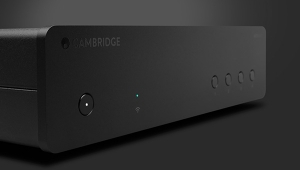| Columns Retired Columns & Blogs |
ITunes Pluses and Minuses?
On May 30, Apple officially launched iTunes Plus, billed as "DRM-free music tracks featuring high-quality 256kbps AAC encoding for audio quality virtually indistinguishable from the original recordings." The initial material available from the iTunes Plus section of the iTunes Media Store is, for the moment, limited to EMI artists, although other labels have announced pending deals with Apple. The "improved" songs sell for $1.29 rather than the standard 99¢.
Early on quite a few glitches seemed to mark many consumers' experience with iTunes Plus files. In order to access the iTunes Plus part of the iTunes Media Store, consumers must download iTunes 7.2 for their computers. Some consumers have reported that, having done this, the iTunes Plus downloads were hit or miss, or worse, quite slow.
Other consumers reported that iTunes Plus downloads did not support the load/burn/rip hack that allowed users of earlier versions of iTunes to download files, burn them to CDs (thus stripping the DRM jacket), and rip them to MP3 format to load them onto personal digital players. That is to say, the iTunes Plus files ripped to MP3 did not load on to iPod players.
Online magazine Playlist looked into this last problem and posted a workaround for it, calling it a "bug," rather than a deliberate Apple tactic.
A far less benign discovery, however, was one made by The Unofficial Apple Weblog and Ars Technica that Apple embeds customer account information, including user name and email address, into each downloaded file. Initially this was reported as a new feature, unique to iTunes 7.2, but Ars Technica examined the Unix coded strings for all iTunes Media Store files and discovered that the information had always been embedded in there. No one had noticed previously because it never occurred to anyone that encrypted iTunes files would be shared.
If you're a law-abiding citizen who would never dream of posting your legally acquired iTunes files to BitTorrent or its ilk, why would you be concerned about this? For one thing, Apple did not reveal that it was embedding personal information into the downloads, which, at the very least, would have been polite. Additionally, this is precisely the sort of information that real pirates could easily "spoof," putting trusting law-abiders at risk of RIAA lawsuits or other forms of data mining.
Okay, despite annoying bugs and horrifying privacy issues, the question audiophiles will be asking is do 256kbps files sound better?
In the experience of John Atkinson, Jon Iverson, and myself, 256kbps does offer an incremental improvement in audio quality, although it is far from "virtually indistinguishable from the original." Neither is 320kbps, although it is noticeably better than 128 or even 256kbps. Apple and the labels could easily solve the whole "as good as CD" issue by releasing full-resolution files and allowing the customer to compress them as needed, but obviously Apple has bought the labels' line on how larcenous their customers are. Actually, it is unlikely that the true pirates are buying iTunes or iTunes Plus files at all, given the availability of P2P networks.
Even mainstream magazines such as PCPlus are questioning the quality advantage of 256kbps. In his article on the new DRM-free iTunes Plus files, Michael Brown posed an interesting question: Which had more effect on sound quality: the higher bit-rate or junking the cheap Apple earbuds for a pair of Shure's $400 Se420 in-ear 'phones?
Read the article. Brown decided that the differences in bit-rate probably mattered less than the DRM-free aspect—and, as he points out, the best way to get DRM-free files is to buy the CD and rip the tracks yourself.
Hear, hear!
But his conclusions about the headphones are fascinating. We happen to think he's on the money there, too.
- Log in or register to post comments




































